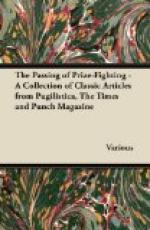III. “Supplement to the above;” consisting
of “Opinions of the Press,”
on various Works by
George Stephens, 8vo., pp. 8.
IV. “Opinions of the Press upon the
‘Dramatic Merits’ and ’Actable
Qualities’ of
the Hungarian Daughter,” 8vo., closely printed,
pp. 16.
The blind and vulgar prejudice in favour of Shakspeare, Massinger, and the elder dramatic poets—the sickening adulation bestowed upon Sheridan Knowles and Talfourd, among the moderns—and the base, malignant, and selfish partiality of theatrical managers, who insist upon performing those plays only which are adapted to the stage—whose grovelling souls have no sympathy with genius—whose ideas are fixed upon gain, have hitherto smothered those blazing illuminati, George Stephens and his syn—Syncretcis; have hindered their literary effulgence from breaking through the mists hung before the eyes of the public, by a weak, infatuated adherence to paltry Nature, and a silly infatuation in favour of those who copy her.
At length, however, the public blushes (through its representative, the provincial press, and the above-named critical puffs,) with shame—the managers are fast going mad with bitter vexation, for having, to use the words of that elegant pleonasm, the introductory preface, “by a sort of ex officio hallucination,” rejected this and some twenty other exquisite, though unactable dramas! It is a fact, that since the opening of the English Opera House, Mr. Webster has been confined to his room; Macready has suspended every engagement for Drury-lane; and the managers of Covent Garden have gone the atrocious length of engaging sibilants and ammunition from the neighbouring market, to pelt the Syncretics off the stage! Them we leave to their dirty work and their repentance, while we proceed to our “delightful task.”
To prove that the “mantle of the Elizabethan poets seems to have fallen upon Mr. Stephens” (Opinions, p. 11), that the “Hungarian Daughter” is quite as good as Knowles’s best plays (Id. p. 4, in two places), that “it is equal to Goethe” (Id. p. 11), that “in after years the name of Mr. S. will be amongst those which have given light and glory to their country” (Id. p. 10); to prove, in short, the truth of a hundred other laudations collected and printed by this modest author, we shall quote a few passages from his play, and illustrate his genius by pointing out their beauties—an office much needed, particularly by certain dullards, the magazine of whose souls are not combustible enough to take fire at the electric sparks shot forth up out of the depths of George Stephens’s unfathomable genius!
The first gem that sparkles in the play, is where Isabella, the Queen Dowager of Hungary, with a degree of delicacy highly becoming a matron, makes desperate love to Castaldo, an Austrian ambassador. In the midst of her ravings she breaks off, to give such a description of a steeple-chase as Nimrod has never equalled.




